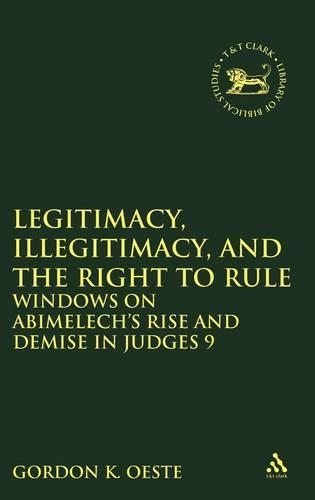
Legitimacy, Illegitimacy, and the Right to Rule: Windows on Abimelech's Rise and Demise in Judges 9
(Hardback)
Available Formats
Publishing Details
Legitimacy, Illegitimacy, and the Right to Rule: Windows on Abimelech's Rise and Demise in Judges 9
By (Author) Gordon K. Oeste
Bloomsbury Publishing PLC
T.& T.Clark Ltd
15th September 2011
United Kingdom
Classifications
Tertiary Education
Non Fiction
Old Testaments
222/.3206
Physical Properties
Hardback
288
Description
This book explores the portrayal of the rise, reign, and demise of Abimelech in Judges 9 and asks about whose interests this portrayal may have served. The negative depiction of Abimelech's kingship in this chapter, coupled with Gideon's rejection of kingship in Judges 8:22-23, has led interpreters to view the passage as anti-monarchic. This perspective clashes with the pro-monarchic stance of Judges 17-21. However, while the portrayal of Abimelech's kingship is negative, it may yet have served as a legitimation strategy for the monarchy. In support, this study examines Judges 9 through three methodological lenses: a narrative analysis, a rhetorical analysis and a social scientific analysis. In addition, anthropological data on early and developing states shows that such states attempt to prevent fissioning (the tendency inherent within political systems to break up and form other similar units) by subverting local leaders, groups, and institutions, and so legitimate the centralization of power. When read in this light, Judges 9 supports monarchic interests by seeking to subvert localized rule and alliances in favor of a centralized polity.
Reviews
a refreshing and valuable contribution to the study of the story of Abimelech. Indeed, the time may come when O[este]s book will be counted among the seminal publications that paved the way toward recovering a measure of consistency in the political agenda of Judges. -- Serge Frolov, Southern Methodist University * The Catholic Biblical Quarterly *
Author Bio
Gordon Oeste is the Associate Professor of Old Testament and Hebrew at Heritage Theological Seminary, Cambridge, Ontario.
